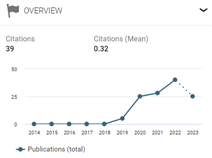Pengaruh frekuensi menonton drama korea, kebiasan makan, dan pendidikan terhadap kualitas diet dan status gizi mahasiswa Politeknik Negeri Balikpapan
DOI: 10.30867/gikes.v5i2.1568Abstract
Background: Korean drama is a type of entertainment that is popular with many groups, one of which is students. The quality of a student's diet is related to what they consume, the frequency and adequacy of the food consumed. The nutritional status of students can vary due to their eating habits and daily patterns. It is necessary to know how much influence these factors have on students' nutritional status.
Objective: This study aims to determine the influence of frequency of watching Korean dramas, eating habits, level of education on diet quality and nutritional status using path analysis.
Method: This research used a quantitative descriptive design with a cross-sectional method, carried out for three months (July-September) 2022 at the Poltekba campus, involving 81 respondents, first-level and second-level culinary arts students, with samples taken using a purposive sampling technique. Data were analyzed using univariate tests to describe descriptive data and multivariate using path analysis to see the influence between variables.
Results: The results stated that eating habits affect the quality of diet and nutritional status of students (p=0.03). While Korean dramas, and education significantly have no effect.
Conclusion: Eating habits can directly influence diet quality, but korean dramas, education level and diet quality do not affect the nutritional status of students.
Keywords
Korean Drama, Diet Quality, Path Analysis
Keywords
Full Text:
PDFReferences
Briawan, D., & Miskiyah, A. (2022). Kualitas diet, aktivitas fisik, dan status gizi remaja, selama masa pandemi covid-19 di Kota Bogor (diet quality, physical activity, and nutritional status of adolescents during the covid-19 pandemic in Bogor City). Jurnal Gizi Dietetik, 1(1), 8–15.
Djide, N. A. N., & Pebriani, R. (2023). Pengetahuan gizi dan kebiasaan makan pada mahasiswa. Media Kesehatan Politeknik Kesehatan Makassar, 18(1), 112–118.
Ferari, S. P., & Nadhiroh, S. R. (2023). Literature Review: pola makan dan kualitas diet pada remaja dan dewasa dengan HIV/AIDS. Jurnal SAGO Gizi Dan Kesehatan, 5(1), 114–123. https://doi.org/10.30867/gikes.v5i1.1317
Hardiayanti, D. (2021). Pengaruh korean wave fanatisme pada keputusan pembelian street food korea selatan: Studi Pada generasi z. Universitas Bakrie.
Hashimoto, A., Murakami, K., Kobayashi, S., Suga, H., & Sasak, S. (2021). Associations of education with overall diet quality are explained by different food groups in middle-aged and old Japanese women. Journal of Epidemiology, 31(4), 280–286. https://doi.org/10.2188/jea.JE20200030
Ibrahim, N., & Ahmad, A. (2021). Analysis of the risk factors of eating habit in midwifery students in Banda Aceh. 14(1), 1–6.
Kemenkes RI. (2014). Infodatin.
Lupitasari, S., Nurlaela, L., & Miranti, M. G. (2020). Pengaruh korean wave dan makanan korea terhadap minat makan hidangan korea pada masyarakat Kota Madiun. Junral Tata Boga, 11(1).
Mizia, S., Felińczak, A., Włodarek, D., & Syrkiewicz-świtała, M. (2021). Evaluation of eating habits and their impact on health among adolescents and young adults: A cross-sectional study. International Journal of Environmental Research and Public Health, 18(8). https://doi.org/10.3390/ijerph18083996
Ningrum, S. T., Sinaga, T., & Nurdiani, R. (2023). Pengetahuan Gizi, perubahan kebiasaan makan dan gaya hidup, serta status gizi mahasiswa saat pandemi covid-19. Jurnal Ilmu Gizi Dan Dietetik, 1(3), 156–164. https://doi.org/10.25182/jigd.2022.1.3.156-164
Pfeifer, D., Rešetar, J., Šteković, M., Czlapka-Matyasik, M., Verbanac, D., & Gajdoš Kljusurić, J. (2023). Diet quality and its association with lifestyle and dietary behaviors among croatian students during two covid-19 lockdowns. Foods, 12(13). https://doi.org/10.3390/foods12132532
Pratiwi, M. Y., & Iriani, R. D. D. S. (2023). Body image overview of emerging adult k-pop leaders. Indonesian Journal of Innovation Studies, 21, 1–15. https://doi.org/10.21070/ijins.v21i.802
Rahmad, A. H., Fadjri, T. K., Fitri, Y., & Muliyani, N. S. (2021). Sosialisasi pola makan dan sedentari dalam mencegah masalah obesitas pada anak sekolah dasar di Kota Banda Aceh. Jurnal PADE: Pengabmas Dan Edukasi, 1(2), 62–66. https://doi.org/10.30867/pade.v1i2.708
Santoso, S. O., Janeta, A., & Kristanti, M. (2018). Faktor-faktor yang berpengaruh terhadap pemilihan makanan pada remaja di Surabaya. Jurnal Hospitality Dan Manajemen Jasa, 6(1), 19–32.
Sari, R. I., & Dewi Sartika, R. A. (2019). Factors associated with nutritional status of adolescents age 12-15 years in Indonesia (Secondary data analysis of RISKESDAS 2007). KnE Life Sciences, 4(10), 359. https://doi.org/10.18502/kls.v4i10.3806
Sari, S. L., & Akmal, N. (2019). Hubungan intensitas menonton iklan makanan di televisi dengan perilaku konsumsi makanan cepat saji siswa SMK Panca Budi 2 Medan. Garnish: Jurnal Pendidikan Tata Boga, 3(2), 53–58.
Sarwono, J. (2011). Mengenal path analysis. Jurnal Ilmiah Manajemen Bisnis, 11(2), 285–296.
Septiyani, putuayu indira, Herawati, & A, tsani arif fahmy. (2017). Faktor-faktor berhubungan yang berhubungan dengan pemilihan makanan siswa sekolah menengah atas di Kota Yogyakarta. 8(2), 73–83.
Talitha Reyhan Widana, & Hermanu, D. H. (2021). Faktor menonton drama korea melalui media online (web) pada remaja putri. Ganaya : Jurnal Ilmu Sosial Dan Humaniora, 4(2), 400–419 . https://doi.org/10.37329/ganaya.v4i2.1328
Tobelo, C. D., Malonda, N. S. H., Amisi, M. D., Kesehatan, F., Universitas, M., Ratulangi, S., & Abstrak, M. (2021). Gambaran pola makan pada mahasiswa semester vi fakultas kesehatan masyarakat Universitas Sam Ratulangi selama masa pandemi covid-19. Jurnal KESMAS, 10(2), 58–64.
Topan, D. A., & Ernungtyas, N. F. (2020). Preferensi menonton drama korea pada remaja. Jurnal Pustaka Komunikasi, 3(1), 37–48.
Widawati. (2018). Gambaran kebiasaan makan dan status gizi remaja di SMAN 1 Kampar tahun 2017. Jurnal Gizi: Nutritions Journal, 2(2013), 146–159.
Refbacks
- There are currently no refbacks.














